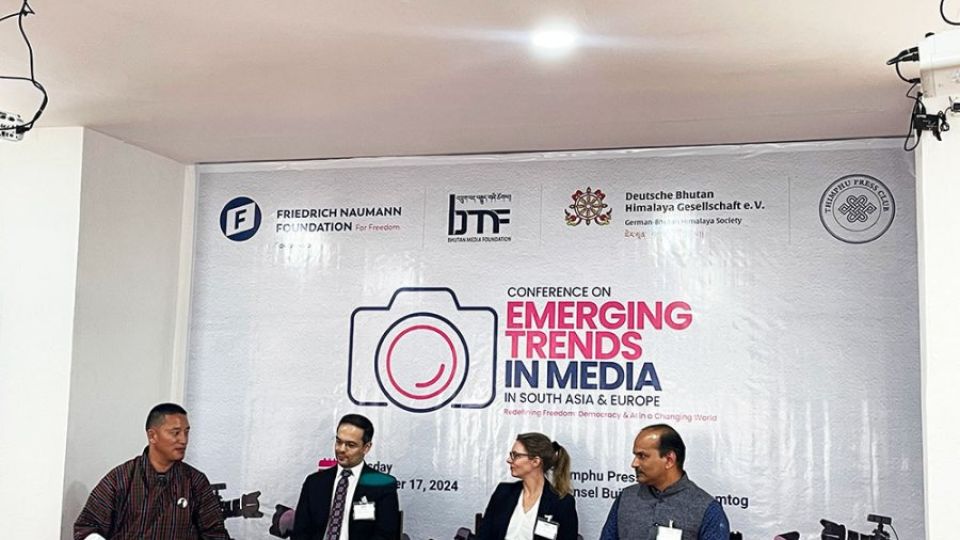September 19, 2024
THIMPHU – A crucial dialogue on two pressing global issues—freedom of the press and the influence of artificial intelligence (AI) in democratic elections—unfolded yesterday at the Thimphu Press Club in Changzamtog.
Organised by the Bhutan Media Foundation, the event brought together key media professionals from Bhutan and international delegates, including Frank Müller-Rosentritt, a member of the German Bundestag representing the Free Democratic Party.
The exchange sought to foster greater understanding of the evolving media landscape and the risks posed by unchecked technology in shaping democratic outcomes.
Müller-Rosentritt, a staunch advocate of democratic rights, emphasised the role of social media in modern democracies but sounded a note of caution. He remarked that while social media platforms can foster engagement and mobilise public opinion, they can also become dangerous tools for manipulation if not carefully monitored.
“Censorship is a threat to democracy,” he warned, “because it skews the balance of power, favouring those already in control.”
His comments came at a time when democracies across the globe are grappling with how to regulate social media without infringing on free speech.
The discussion quickly turned toward Bhutan’s own media environment, specifically in light of the country’s falling press freedom ranking in recent years. Bhutanese media professionals at the exchange rejected the ranking, arguing that it failed to capture the nuances of Bhutan’s unique media ecosystem.
Kinley Tshering, Kuensel’s managing editor, was particularly vocal, asserting that Bhutan’s press freedom cannot be adequately measured by external indices alone.
“The freedom of the press in Bhutan is best understood by Bhutanese,” he said, pointing out that the international metrics often fail to consider the social and cultural contexts that underpin Bhutan’s media environment.
He argued that Bhutan’s media, while evolving, remains free within its own context, maintaining a balance between public accountability and cultural sensitivities.
As the session transitioned into the complexities of AI, the focus shifted to the technology’s growing role in influencing elections. The panel explored how AI, if left unchecked, could potentially be used to manipulate voting behaviour by targeting specific demographics with disinformation or by amplifying polarising content.
While AI has yet to play a significant role in Bhutan’s electoral processes, the conversation underscored the need for preparedness. Bhutan, with its nascent digital infrastructure, must be ready to confront this reality as its democratic institutions grow more complex and interconnected with global trends.
The discussion on AI also underscored a broader, more sobering concern: the fine line between harnessing technology for good and allowing it to not undermine democratic principles.
Delegates and local media professionals alike agreed that, while AI can enhance electoral transparency and voter engagement, it must be used responsibly.
Bhutan’s experience, as a young democracy, offers it a unique opportunity to learn from the missteps of more established democracies and put measures in place to safeguard its elections from technological interference, a visiting delegate remarked.
A sobering reminder was that in an age of rapid technological advancement, Bhutan’s young democracy stands at a crossroads, and as it navigates the delicate balance between safeguarding press freedom and preparing for the impact of AI on its electoral processes, wise should be made.


